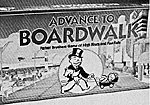
Parkers Bros.
Released: April 1985
Catalog: 0014
Price: $9.95
Complexity: Beginner
Solitaire: None
** 1/2
Advance to Boardwalk is a board game designed to simulate the high stakes world of ocean-front hotel building. It is a 2- 4 player game recommended for ages 8 and up. The game is fairly fast paced, with a two- player game concluding within the stated "Approximate playing time: 45 minutes," though a four-player game is going to take at least twice that long.
On first examination, all of the game's components are of a high quality. The long, narrow game board is attractive and well laid- out, and the excess space is decorated with a humorous beach scene. The Fortune cards are on a durable heavy stock, and the Property cards are also nice. In play, however, the design of several of the pieces proved less than adequate. The narrowness of the places on the game track proved inconvenient when more than one player was on a spot, and the Fortune card stock was so heavy that the cards were difficult to shuffle.
The odd choice of colors for the four sides was also poor; when playing on the floor it became almost impossible to tell the reddish hotels from the burgundy ones. This meant that players were constantly forced to pick up hotel stacks to figure out who owned what. Primary colors would have been better than the burgundy, rust red, and gray that are used for three of the token and hotel colors.
The main playing tokens were also disappointing. They, too, suffer from the red/burgundy color definition problem. They are poorly-detailed, chopped-plastic extrusions that are only marginally identifiable as a baby buggy, roller skate, sailboat, and moped.
Comparisons to Monopoly are unavoidable and actually seem to have been encouraged by the publishers. Many of the same graphic styles found in Monopoly are also found in Advance to Boardwalk. Nevertheless, it has little in common with the basic design of Monopoly, and actual play is very different.
The game will probably never approach the status of Monopoly. There is far too little to do, and any player older than 12 will feel constrained by the limited number of advancement options that are available. Advance to Boardwalk also lacks flexibility in its design that would allow variant rules to be created by individuals to spice up the game. There is no cash money to save from turn to turn, so there is no way to make deals with fellow players.
Instead of earning money from properties, spending money in Advance to Boardwalk comes from the roll of the dice. Each player gets between 2 and 12 million dollars to spend on hotel units in four zones of the boardwalk. The roll of a special color die determines which zone the player must spend his or her money in, or if the player may draw a Fortune card. it is also possible to roll a W (for wild) on the zone die, which allows the player to build in any zone.
Wealth is measured purely in terms of property controlled, and money gained by the roll of the dice is lost if not spent in the same turn that it was received. Property is not a liquid asset; it is not possible to convert it into anything that would allow characters to cooperate. Conversely, it is very difficult to play a mean or vicious game of Advance to Boardwalk.
The early turns of the game are really dull. There are so many movement options that the players will never need to deal with each other.
The strategy in the game makes it difficult to mount a campaign to weaken a powerful player, and there is no way that weaker characters can gang up to overwhelm an otherwise unstoppable player. No one is unstoppable, and a group of individual attacks are just as effective as a single coordinated one.
On the positive side, the rules are clear and concise. They are so short that they could easily be reprinted on two cloublespaced typed pages. The game is also a good test of the math skills of youngsters in a way very different from the money managing in Monopoly. Your token's position on the board has to match the total worth of your properties, and good tactics require a close to total use of the amount on the die roll-a task that needs some math work once all the easy spots have been taken.
There is nothing wrong with the design of Advance to Boardwalk; there just is not much that is really good. The challenge of competition for anything except the best die roll and most powerful Fortune cards is missing.
More Adult Game Reviews
-
Game Review: Advance to Boardwalk: Game of High Rises and Fast Falls
Game Review: Junta: "Banana Republic" Politics
Game Review: Sovereign of the Seas: Clipper Ship Commerce
Game Review: Avalon Hill Trivia: Set 1
Back to Table of Contents -- Game News #6
To Game News List of Issues
To MagWeb Master Magazine List
© Copyright 1985 by Dana Lombardy.
This article appears in MagWeb (Magazine Web) on the Internet World Wide Web.
Other military history articles and gaming articles are available at http://www.magweb.com